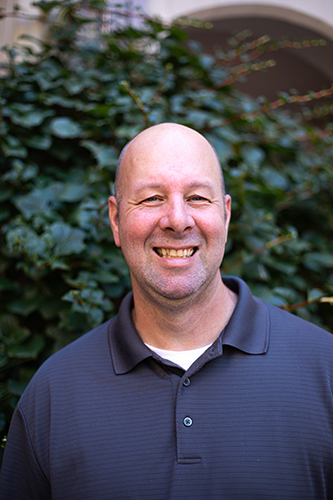What Makes Point Park University the Right Choice for Aspiring IT Professionals?

Pittsburgh's robotics and autonomy industry is poised for a flurry of growth over the next several years, as President Joe Biden announced this fall that the Southwestern Pennsylvania New Economy Collaborative, a group of 90 organizations throughout the region focused on bolstering training and job opportunities in the field, will receive a $62.7 million investment through the Build Back Better grant program.

Jeffrey Seaman, M.I.S. Photo by Madi Fisher '24.
In the Rowland School of Business at Point Park University, faculty use their real-world experiences and knowledge to prepare students in the applied computer science program for the surge of tech jobs on the horizon. With a campus right in the heart of Downtown Pittsburgh, located near established companies and rising start-ups with internships and co-ops, Point Park's program is well-equipped to provide students with the skill sets and experiences needed to stand out in the job market.
In the Q&A below, hear from Jeffrey Seaman, M.I.S., assistant professor of applied computer science, about what makes Point Park's program a solid choice for students looking to plant roots in Pittsburgh's growing tech sector. He brings more than 20 years of industry experience to the classroom.
What are the distinctive qualities of Point Park’s applied computer science program?
Compared to other universities, we have a smaller cohort, so students get much more individualized time focused on them, while other universities might have up to 100 students in a class. Students can get their questions answered more easily. They're able to have more one-on-one time with faculty members, which allows them more meaningful engagement. We have intelligent, experienced faculty members who have worked in the industry for many years. Students receive a thorough education while learning what to expect when they enter the field.
What are some of the courses students can expect to take?
Some of the key classes they'll take include:
- Introduction to Databases, which digs into how to create a database and how databases are applied in various online environments, such as Google.
- Data Structures, which teaches students the basic fundamentals of data analytics.
- Introduction to Programming, where students learn how to write Javascript and debug data.
- Advanced Programming, which combines programming with APIs and a variety of up-and-coming technologies to give students a well-rounded skill set.
- Mobile App Development, where students learn how to create an app in Swift, a programming language for iOS, or Java or Kotlin, which are languages for Android. They can also use a third-party tool that functions across all platforms.
- Digital Security, which has become very popular because data security is a massive concern in today's world.
Describe the faculty’s approach to teaching.
Our faculty make connections between complex concepts and easy-to-understand real-world examples to help students grasp the material more easily. For example, when we talk about what a queue is, we relate it to being in a queueing line for a concert. It's about getting them to understand the fundamentals of the concept and then building upon that. Applying things that happen in real-life to talk about concepts in programming helps a lot. It provides an easier way to work through the material. Again, we also offer small class sizes, so even if a student doesn't get a concept on the first couple of tries, we are there to help guide them.
How would you describe the applied computer science landscape in Pittsburgh?
What's interesting about Pittsburgh is it is such a small place, but we have so many heavy-hitter companies here. We have Facebook, Google and Amazon, but we also have legacy companies like Duquesne Light Company, Highmark and PNC Bank, all of which need IT professionals. The sky is the limit here. Students have better job opportunities here now than when I entered the field 20 years ago because IT capabilities continue to evolve and grow.
What could this new investment in the tech sector mean for applied computer science jobs in Pittsburgh?
It means many opportunities. Anytime an entity provides a big investment to anything afflilated with computer science, it opens up opportunities for anyone in that field. These employers will be looking for well-rounded, skilled candidates, and our courses, as well as the opportunities Point Park offers outside of class, will prepare students to be that candidate. Our Information Technology Club allows students to level up their capabilities by applying what they've learned in class to their own projects. Pittsburgh, in general, has a healthy tech sector and it's only going to get better. Attending Point Park gives applied computer science students a competitive edge because they can access internships, co-ops and other activities that will make them stand out during the job application process.

